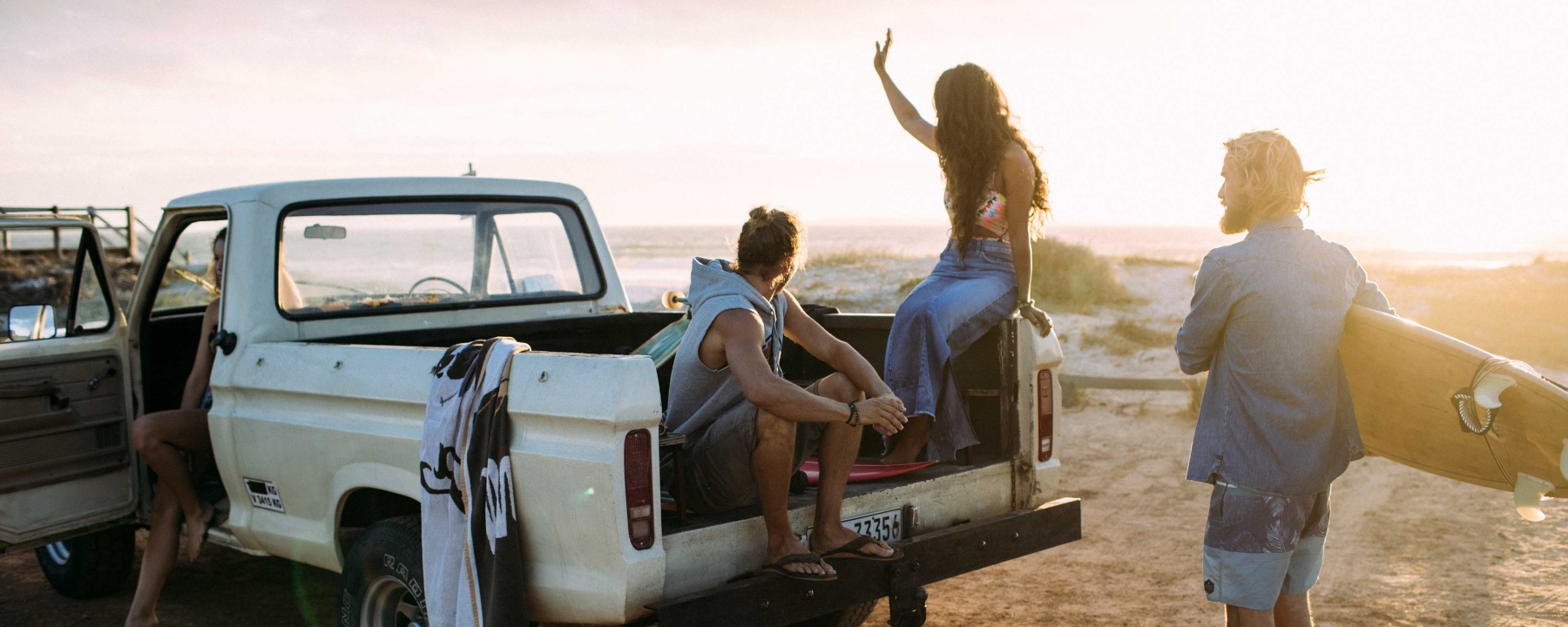
Hair and scalp
Hair, sun, sun protection
The need for sun protection has now caught on with people. Awareness of this important part of your personal care routine is growing steadily. However, one part of the body still gets forgotten too often: On sunny days, the burning celestial body beats directly down onto it.
Let’s start with a description of the situation and some questions to our customers, consumers, and readers: After a vacation – let's say a hot, sunny summer vacation – you come home completely relaxed, well rested and looking super. How often have you been surprised that your hair did not seem to enjoy that time so much? How often have you asked yourself why your hair is suddenly dry, with so many split ends and a much lighter color than before you went on vacation?
If your answer is “Never”, then you are welcome to move on to another article. You seem to know that hair can also suffer under the sun and, just like your skin, needs sun protection to keep and look healthy. Or you’re bald, and you're used to using sun protection and sunscreen.
Hair: the natural protective screen
Strictly speaking, hair itself is a form of sun protection. As a natural protective screen, it protects the scalp from sunburn and the health issues that arise from this, such as premature aging and, in a worst-case scenario, skin cancer. The degree of protection depends on the volume and quality of the hair. Thiner and less dense hair allows more harmful UV rays to reach the scalp than thicker and more dense hair. However, you shouldn't rely on this kind of protection alone. Additional sun protection is definitely needed.
Now, we could tell you that hair cannot get sunburn like the entire skin surface of your body, including the scalp. Strictly speaking, this is actually true. But that would mean ignoring what actually matters: that hair can suffer enormous damage if it is forced to sunbathe without protection. This damage does not cause any pain. The scratching, itching and burning, for example, on your bright red burnt back, only occurs with typical sunburn. But the damage is still visible. You could almost describe it in the terms that the hair is burnt up and damaged by the intense UV rays and the heat of the sun.
UVA and UVB rays do actually damage the outer layer of the hair, the cuticle, leaving the hair and the inner hair, the cortex, vulnerable. Hair proteins – keratin – are also affected by this, suffering acute damage from UVB rays (290 nm – 320 nm). The result: Loss of tensile strength, elasticity and shine. Split ends are another consequence of this, as are coarse hair and loss of color. You could refer to this as photo-aging of the hair, an effect that we know about from skincare. Generally speaking, this is not something a man or woman likes to see when they look in the mirror.
For blondes and redheads, their hair will become much lighter after intense exposure to the sun compared to people with dark hair. While the eumelanin color pigment can provide greater defense against fading in dark hair, the pheomelanin in blond and red hair is not as strong and is destroyed more quickly. In addition, dark-haired people have a higher level of melanins. UVA rays in the 320nm – 400 nm range are primarily responsible for the change in hair color.
The sunny side of life
"We love the sun. But we also know that sun protection is very important nowadays.” Everything worth knowing about the sun and useful tips on how to protect yourself.
All about sunUV filters also in hair care products
Of course, there is not just one single best way to protect your hair, but at least there is a very simple, almost banal solution: Wear a hat, cap or headscarf, preferably made from fabrics that are also UV protected. As a result, no UV rays reach the hair or scalp, thus providing the ultimate form of protection. If this type of headgear just isn't your style, there are other products that can protect you. Staying home just to avoid the sun’s rays is not a solution that anyone either wants or is able to practice all their life.
But before you start rubbing suntan cream into your hair: In addition to shampoos, conditioners and spray-based sunscreens, there are now plenty of hair care products that contain sun protection as standard. BASF has released UV filters on the market that can be used by producers of cosmetic products in hair care products to provide maximum protection. When applied before going out in the sun, they provide the hair with the protection it needs. Sun liquids will also protect the scalp well. After sunbathing for a prolonged period, it is important to use products that care for the hair – such as conditioners and rinses – in order to stimulate regeneration.
Especially when you know that you are going to be exposed to the sun for a defined period of time, for example, while on vacation, by spending days on a sun lounger or boat, you should avoid chemical applications for your hair. Coloring, dyeing blond, perms are some examples. However, these cosmetic and chemical substances are known to be stress factors for hair, and make the hair particularly susceptible to further damage. That also includes applications of heat, such as using straighteners, curling irons, and so on. Your hair gets enough heat from the sun.
Protect your head
Sea water or water containing chlorine in swimming pools are also stress factors and promote “sun damage”. Regular hair washing and rinsing out salty and/or chlorinated substances help enormously in keeping the hair’s own protective shield intact.
In general, of course, it is important to think about sun protection, particularly protecting your scalp, at other times, not only on your summer vacation. You need to protect your head during all outdoor activities. Follow the example of the many athletes who wear a cap when practicing their hobby outdoors (such as golfers, hikers, marathon runners). You should also have your dermatologist or hairdresser take a closer look at your scalp from time to time in order to detect melanoma, moles or other signs of damage as early as possible.
Protecting ourselves from the sun doesn't mean we don't love it. Quite the opposite: But we want to enjoy it when it is beating down on us. Keeping our skin and hair intact.

